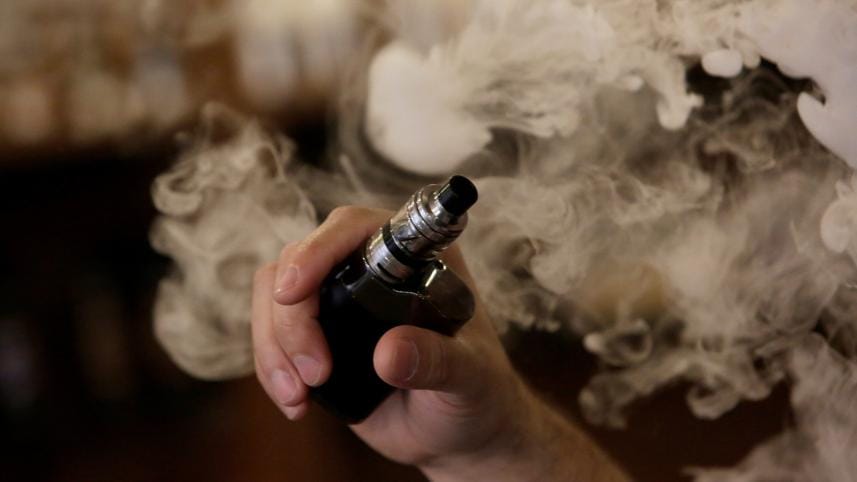The truth about e-cigarettes

On January 7 this year, the Bangladesh government issued a ban on the import of "e-cigarettes/electronic nicotine delivery systems." This decision came after discussions surrounding restrictions on the import of e-cigarettes to "protect public health and future generations from their harmful effects."
Many of you might remember a protest earlier on December 28 last year, when people took a stand to stop this oncoming ban. At the time, many people, including me, had a laugh at the expense of "vapers fighting to protect their vapes." While I can agree with many about the "vape bro" stereotype, I do want to talk about the more serious situation that has escaped us. Because the truth is, I was once a "vape bro" myself—I used e-cigarettes to quit smoking.
At the age of 15-16, I smoked my first cigarette. Despite the Juvenile Smoking Act, 1919, anyone who has ever smoked a cigarette knows these laws—like many others in Bangladesh—are largely disregarded. I was 18 when I finally managed to quit cigarettes for the first time and stayed off nicotine for almost four years, before I resumed smoking again when I was in university. It was only when I discovered the world of e-cigarettes that I was able to bid adieu to the infamous cancer sticks that the government is yet to ban, despite them also being filled with nicotine.
My story isn't unique; I have heard of numerous others who have been able to quit smoking by using e-cigarettes. However, that does not mean that I blindly support the use of e-cigarettes and vapes. Even before I bought my first vape in 2018, I took the time to research the benefits and downsides that come with e-cigarettes.
While e-cigarettes have not been around long enough for us to fully understand the long-term problems or benefits that come with them, they are arguably a less harmful alternative to traditional cigarettes. This is in large part due to vapes having a smaller amount of carcinogens—substances like arsenic, benzene, etc that cause cancer.
Additionally, inhaling vapour as opposed to smoking means your throat and lungs are not as irritated compared to when you smoke cigarettes. These conclusions are cited in research done by the National Health Service in the UK and Cancer Research UK. Interestingly, the British healthcare system has encouraged the use of e-cigarettes and vapes as an alternative that can help heavy smokers quit. After realising the potential of e-cigarettes in ending the cycle of tobacco consumption, the British government took major steps to regulate the market for these products to ensure that people switching from cigarettes to vapes did not increase their nicotine intake or get addicted to the variety of appealing flavours as part of their plans for a smoke-free generation.
The British government is world-renowned for its public health policies. So, on what basis has Bangladesh's interim government decided to ban e-cigarettes, rather than do actual good by regulating its market here?
Let me tell you exactly what is going to happen as a result of such bans. Legitimate e-cigarette companies that have been operating in Bangladesh for around 20 years and helping people quit cigarettes will go out of business. Individuals who might have switched from cigarettes will be left with very little choice but to return to smoking because they will no longer be able to buy their e-cigarettes. Finally, because it is Bangladesh, a black market of unregulated vape products will form and lead to disasters, as happened in the US when the FDA simply banned certain vape flavours.
Not only just that, the government will be taking away our right to choose between smoking and e-cigarettes. If e-cigarettes are bad, then guess what? Cigarettes are worse, and that is something we have known for decades.
Additionally, if this is to reduce e-cigarette use among minors, which has not clearly been stated in connection with this decision, then why aren't we imposing the existing Juvenile Smoking Act, as cigarettes are being sold to minors at a much higher rate due to their availability?
This decision by the interim government has no rhyme or reason and definitely has no transparency. No referendums were taken either to determine if this was what the public desired.
Let's get one thing out of the way: I am not advocating for everyone to start vaping and supporting protests in its favour. e-cigarettes should only be an alternative for smokers to transition to a smoke-free life, with the long-term goal being to quit nicotine. If you never smoked, then you don't need to get into vaping at all.
Quitting nicotine was one of the hardest things I have had to do in my life. Numerous times, I have quit and then returned to smoking cigarettes, even years later. But thanks to e-cigarettes, I was able to quit cigarettes at the very least before finally getting off nicotine just last year.
However, if the government is still hell-bent on keeping this ban, they at least need to come forward and provide us with an explanation, along with the reason as to why they have not also decided to ban cigarettes if their real concern is truly to "protect public health and future generations from their harmful effects," as they have stated in their notice.
Aaqib Hasib is sub-editor at The Daily Star. He can be reached at aaqibhasib@icloud.com.
Views expressed in this article are the author's own.
Follow The Daily Star Opinion on Facebook for the latest opinions, commentaries and analyses by experts and professionals. To contribute your article or letter to The Daily Star Opinion, see our guidelines for submission.




 For all latest news, follow The Daily Star's Google News channel.
For all latest news, follow The Daily Star's Google News channel. 

Comments